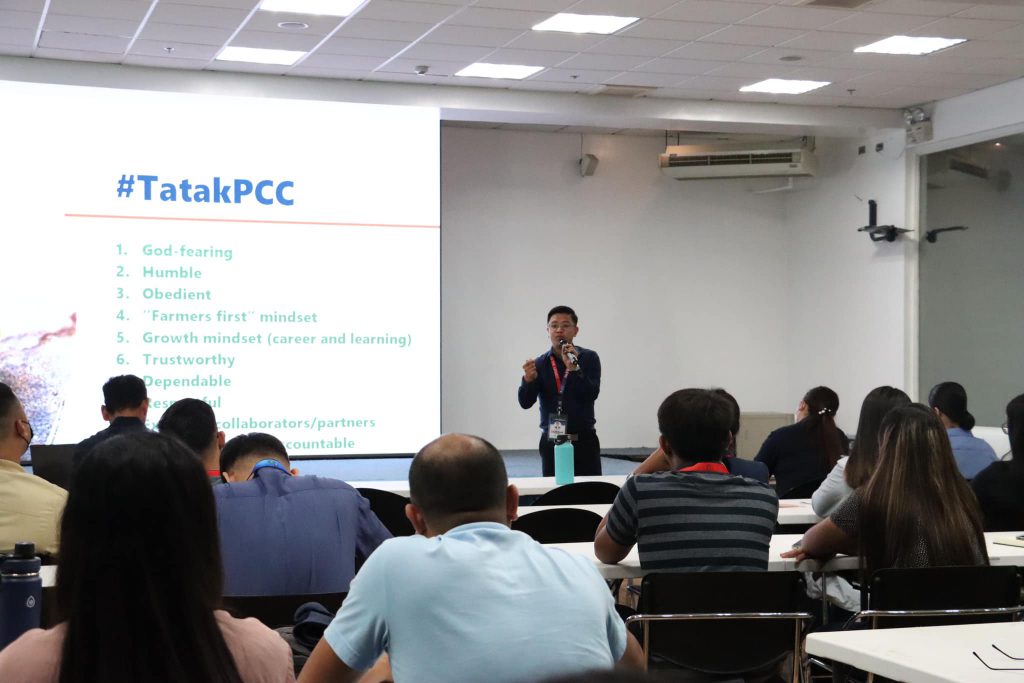The DA-PCC’s New Employee Orientation Program, or NEO, took place on April 4 at Eusebio Hall. It is a learning platform that was designed for new employees, teaching them not only how to be employees, but also the purpose for which they will work.
Several discussants from the agency’s divisions and sections appeared on the NEO program to share useful information with the agency’s new employees.
Dr. Caro B. Salces, PCC’s OIC Executive Director, encouraged all employees to discover their personal stories within the organization because it will help them understand the meaning and importance of serving the Filipino people. He also highlighted PCC’s evolution over the years from a research project to a renowned R&D organization with national and international collaborations. The pioneers and pillars, as well as the employees who worked tirelessly to help the agency achieve its goals, are responsible for this success.
Zadieshar G. Sanchez, OIC of the Planning and Information Management Division (PIMD), emphasized the qualities and standard decorum that all PCC employees should possess.
Dr. Excel Rio S. Maylem, senior science research specialist and unit head of the Reproduction and Physiology Section, spoke about her inspiring path to success. Her experiences and journey demonstrate the importance of believing in yourself and your ability to achieve your goals.
Joshua Villanueva of the Administrative and Finance Management Division (AFMD) provided an overview of the carabao industry, focusing on its four main products: milk, meat, hide, and draft power. He explained that the Carabao Development Program (CDP) is made up of three major components: the Genetic Improvement Program (GIP), R4D, and Carabao-Based Enterprise Development (CBED).
Meanwhile, Cherry Pearl Rivera, AFMD accountant, answered questions from employees about tax, service contracts, and their tax obligations in the agency.
Dr. Ester B. Flores, PCC national GIP coordinator and Scientist I, discussed the GIP’s goal and major activities, which are aimed at improving the genetic potential of native carabaos and purebred water buffaloes through appropriate and advanced selection and breeding protocols.
R4D, according to Dr. Eufrocina P. Atabay, Scientist II, is an important component of the agency’s CDP, which aims to provide science-based solutions to help address the most pressing issues affecting the carabao industry and its stakeholders.
Joel F. Cabading, National CBED Program Coordinator, presented the CBED Program, which promotes the economic benefits of carabao and provides dairy-based livelihood opportunities.
Estella P. Valiente of the Socio-Economics Research Section also presented two major CBED projects, Carabao-based Business Improvement Network (CBIN) and Coconut-Carabao Development Project (CCDP), also known as Accelerating Livelihood & Assets Buildup or ALAB Karbawan, which aim to build strong carabao-based enterprise value chains to promote the creation of livelihood for farmers, increase the income of coconut farmers, and boost the dairy sector.
Alvin David, head of the Planning Section, spoke about the agency’s Foreign Assisted Projects, specifically KOICA and US PL480, which aim to increase the productivity of the country’s smallholder farmers through capability development, germplasm infusion, digitalization, and infrastructure development.
For his topic, Dr. Eric Palacpac, Chief of the Knowledge Management Division, discussed the key elements and constraints of the carabao industry value chain, as well as how the agency can capitalize on opportunities that arise from them.
Farm Superintendent II Dr. Cyril P. Baltazar spoke about farm management, forage and pasture management, feed supplementation, housing and other facilities, minimum space requirement, animal houses, and herd management. Likewise, Pauline Maramag of the Business Development and Commercialization Unit presented the iREB Client Dashboard, which she said helps the agency monitor the performance of enrolled farmer-clients and their dairy buffalo herds.
Meanwhile, Minda R. Diloy’s presentation stated that the agency has maintained its ISO certification status over the years, demonstrating its commitment to providing quality products and services to its stakeholders, protecting the environment, and ensuring the safety of its employees.
As part of the learning event, employees are expected to take an examination.

